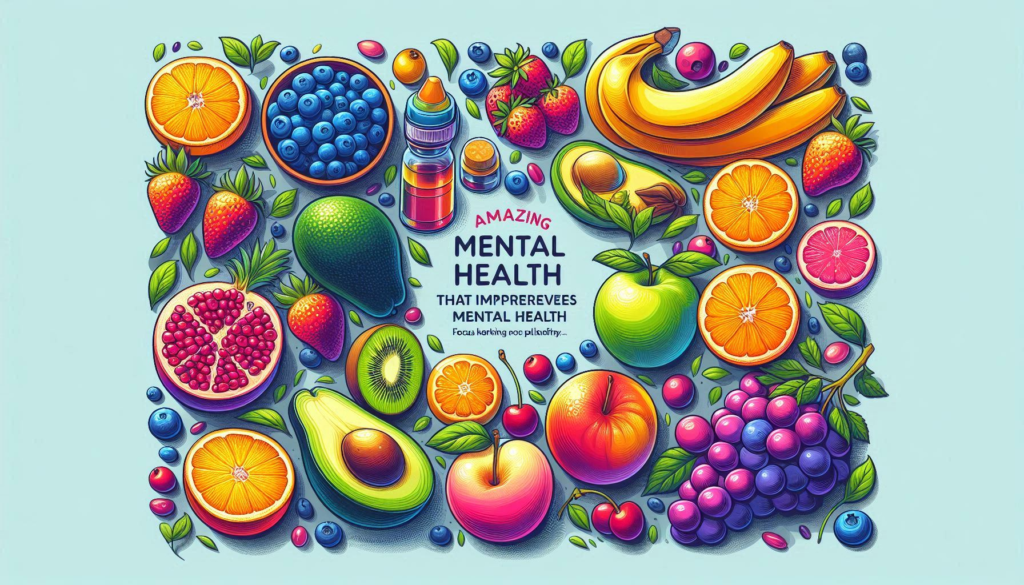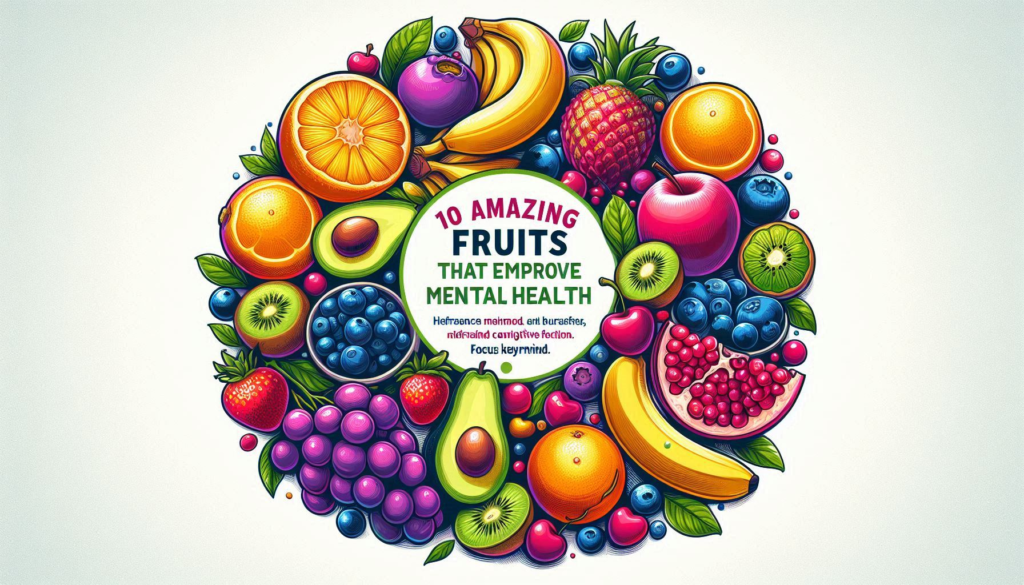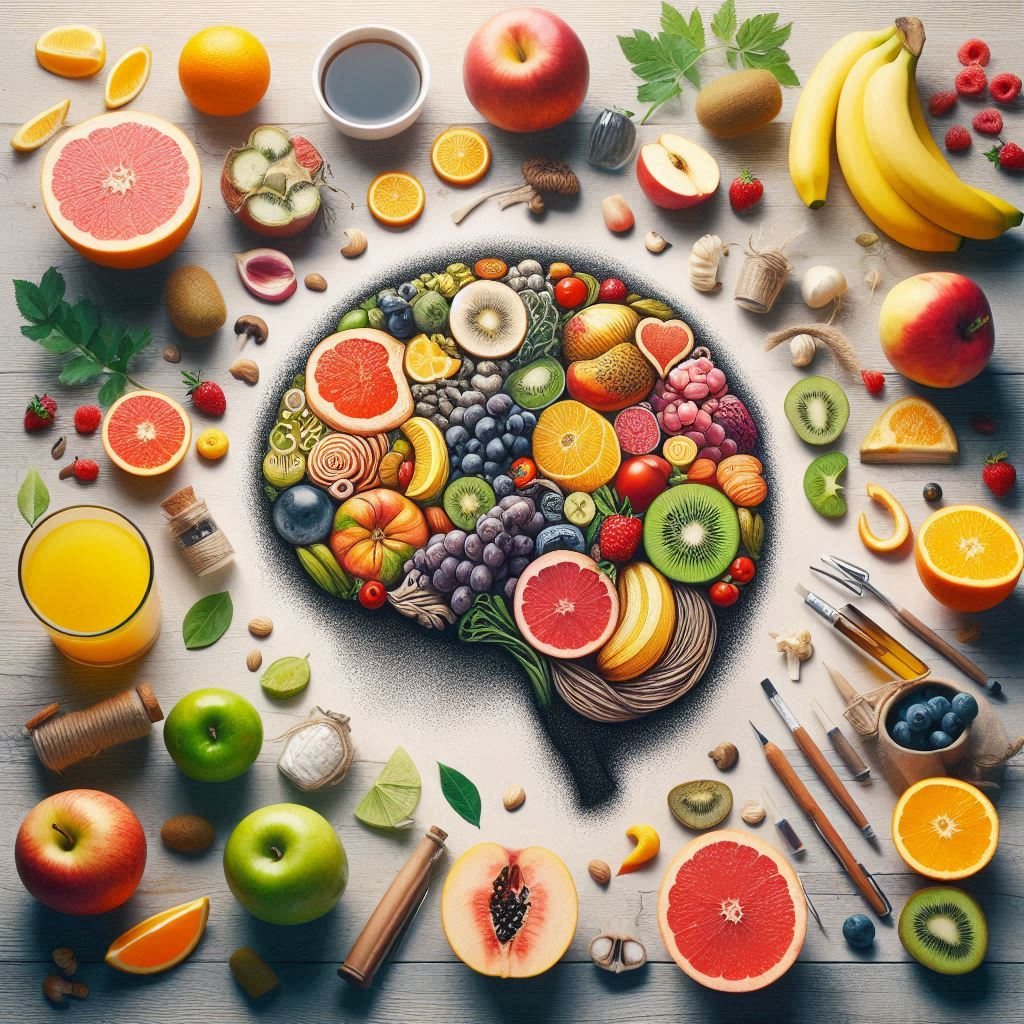10 Amazing Mental Health Fruits
10 Amazing Mental Health Fruits
Amazing fruits improve mental health! Discover 10 incredible fruits that enhance mood, reduce stress, and improve cognitive function.
Introduction

Brief Overview of the Importance of Mental Health
Mental health is a crucial aspect of overall well-being, influencing how we think, feel, and act. It affects our ability to handle stress, relate to others, and make decisions. Maintaining good mental health is essential for leading a fulfilling and productive life.
Introduction to the Role of Diet in Mental Health
Diet plays a significant role in mental health. The foods we consume can impact our brain function, mood, and energy levels. A balanced diet rich in essential nutrients supports cognitive function, emotional stability, and overall mental well-being. Certain foods, particularly fruits, are known to have positive effects on mental health due to their nutrient content.
Explanation of How Fruits Can Positively Impact Mental Health
Fruits are packed with vitamins, minerals, antioxidants, and fiber, all of which contribute to brain health and emotional well-being. They can help reduce inflammation, improve cognitive function, and regulate mood. Incorporating a variety of fruits into your diet can provide the necessary nutrients to support mental health and enhance overall well-being.

Preview of the 10 Fruits That Will Be Discussed
In this article, we will explore the mental health benefits of the following 10 amazing fruits:
- Blueberries
- Bananas
- Oranges
- Avocados
- Strawberries
- Apples
- Grapes
- Pomegranates
- Kiwis
- Cherries
Each of these fruits offers unique benefits that can help boost mental health and improve overall well-being. Let’s dive into the details of how these fruits can make a positive impact on your mental health.
Section 1: Blueberries
Nutritional Profile of Blueberries
Blueberries are rich in vitamins C and K, fiber, and antioxidants such as anthocyanins. They are low in calories and high in nutrients, making them a superfood for overall health.
Benefits for Mental Health
- Antioxidants: Blueberries are packed with antioxidants that protect the brain from oxidative stress and reduce inflammation.
- Anti-inflammatory Properties: The anti-inflammatory properties of blueberries help protect brain cells and improve cognitive function.
- Cognitive Function: Regular consumption of blueberries has been linked to improved memory and cognitive function.
Scientific Studies Supporting the Mental Health Benefits of Blueberries
- A study published in the Journal of Agricultural and Food Chemistry found that blueberries can improve memory and cognitive function in older adults.
- Research from the University of Exeter showed that blueberry supplementation can enhance brain activity and improve working memory in children.
Tips for Incorporating Blueberries into Your Diet
- Add blueberries to your morning cereal or yogurt.
- Blend them into smoothies for a nutritious boost.
- Use them as a topping for pancakes or waffles.
- Enjoy them as a healthy snack on their own.
Section 2: Bananas
Nutritional Profile of Bananas
Bananas are an excellent source of potassium, vitamin B6, vitamin C, and dietary fiber. They are also rich in natural sugars, providing a quick energy boost.
Benefits for Mental Health
- Serotonin Production: Bananas contain tryptophan, an amino acid that helps produce serotonin, a neurotransmitter that regulates mood.
- Mood Regulation: The vitamin B6 in bananas helps convert tryptophan into serotonin, promoting a positive mood.
- Energy Boost: The natural sugars in bananas provide a quick and sustained energy boost, helping to combat fatigue and improve mental clarity.
Scientific Studies Supporting the Mental Health Benefits of Bananas
- A study published in the Journal of Psychopharmacology found that consuming bananas can improve mood and reduce symptoms of depression.
- Research from the University of Reading showed that bananas can enhance cognitive performance and reduce stress levels.
Tips for Incorporating Bananas into Your Diet
- Add sliced bananas to your cereal or oatmeal.
- Blend them into smoothies for a creamy texture.
- Use mashed bananas as a natural sweetener in baking.
- Enjoy them as a convenient and portable snack.
Section 3: Oranges
Nutritional Profile of Oranges
Oranges are rich in vitamin C, fiber, and antioxidants. They are also a good source of folate and potassium, contributing to overall health.
Benefits for Mental Health
- Vitamin C: The high vitamin C content in oranges helps reduce stress and boost the immune system.
- Stress Reduction: Vitamin C has been shown to lower cortisol levels, reducing stress and anxiety.
- Immune Support: A strong immune system supports overall mental well-being by reducing the risk of illness and infection.
Scientific Studies Supporting the Mental Health Benefits of Oranges
- A study published in the American Journal of Clinical Nutrition found that vitamin C can reduce stress and improve mood.
- Research from the University of Otago showed that consuming oranges can enhance cognitive function and reduce symptoms of depression.
Tips for Incorporating Oranges into Your Diet
- Enjoy a fresh orange as a snack.
- Add orange segments to salads for a burst of flavor.
- Drink freshly squeezed orange juice for a vitamin C boost.
- Use orange zest to add flavor to baked goods and dishes.
Section 4: Avocados
Nutritional Profile of Avocados
Avocados are rich in healthy fats, particularly monounsaturated fats, as well as vitamins E, K, and B6, folate, and potassium. They are also a good source of fiber.
Benefits for Mental Health
- Healthy Fats: The monounsaturated fats in avocados support brain health and improve cognitive function.
- Brain Function: Avocados contain nutrients that enhance brain function, including folate and vitamin K.
- Mood Stabilization: The healthy fats and vitamins in avocados help regulate mood and reduce symptoms of depression.
Scientific Studies Supporting the Mental Health Benefits of Avocados
- A study published in the Journal of Nutrition found that avocados can improve cognitive function and memory.
- Research from the University of Illinois showed that the healthy fats in avocados can enhance brain function and reduce symptoms of depression.
Tips for Incorporating Avocados into Your Diet
- Add sliced avocados to salads and sandwiches.
- Use mashed avocados as a spread on toast.
- Blend avocados into smoothies for a creamy texture.
- Make guacamole for a delicious and nutritious dip.
Section 5: Strawberries
Nutritional Profile of Strawberries
Strawberries are rich in vitamins C and K, fiber, folate, and antioxidants such as anthocyanins. They are low in calories and high in nutrients, making them a healthy addition to any diet.
Benefits for Mental Health
- Antioxidants: Strawberries are packed with antioxidants that protect the brain from oxidative stress and reduce inflammation.
- Vitamin C: The high vitamin C content in strawberries helps reduce stress and boost the immune system.
- Anti-inflammatory Properties: The anti-inflammatory properties of strawberries help protect brain cells and improve cognitive function.
Scientific Studies Supporting the Mental Health Benefits of Strawberries
- A study published in the Journal of Nutritional Biochemistry found that strawberries can improve cognitive function and reduce inflammation in the brain.
- Research from the University of California, Los Angeles (UCLA) showed that regular consumption of strawberries can enhance brain health and improve memory.
Tips for Incorporating Strawberries into Your Diet
- Add strawberries to your morning cereal or yogurt.
- Blend them into smoothies for a nutritious boost.
- Use them as a topping for pancakes or waffles.
- Enjoy them as a healthy snack on their own.
Section 6: Apples
Nutritional Profile of Apples
Apples are a good source of vitamins C and A, fiber, and antioxidants such as quercetin. They are low in calories and high in nutrients, making them a healthy and convenient snack.
Benefits for Mental Health
- Fiber: The high fiber content in apples helps regulate blood sugar levels, which can improve mood and energy levels.
- Antioxidants: Apples are rich in antioxidants that protect the brain from oxidative stress and reduce inflammation.
- Blood Sugar Regulation: The fiber in apples helps stabilize blood sugar levels, preventing mood swings and energy crashes.
Scientific Studies Supporting the Mental Health Benefits of Apples
- A study published in the British Journal of Nutrition found that regular consumption of apples can improve cognitive function and reduce the risk of neurodegenerative diseases.
- Research from the University of Massachusetts showed that apples can enhance brain health and improve memory.
Tips for Incorporating Apples into Your Diet
- Enjoy a fresh apple as a snack.
- Add apple slices to salads for a crunchy texture.
- Use apples in baking, such as in pies or muffins.
- Make homemade applesauce for a healthy treat.
Section 7: Grapes
Nutritional Profile of Grapes
Grapes are rich in vitamins C and K, fiber, and antioxidants such as resveratrol. They are low in calories and high in nutrients, making them a healthy and delicious snack.
Benefits for Mental Health
- Resveratrol: Grapes contain resveratrol, a powerful antioxidant that protects the brain from oxidative stress and improves cognitive function.
- Antioxidants: The antioxidants in grapes help reduce inflammation and protect brain cells.
- Brain Health: Regular consumption of grapes has been linked to improved memory and cognitive function.
Scientific Studies Supporting the Mental Health Benefits of Grapes
- A study published in the Journal of Agricultural and Food Chemistry found that resveratrol in grapes can improve memory and cognitive function.
- Research from the University of California, Davis showed that grapes can enhance brain health and reduce the risk of neurodegenerative diseases.
Tips for Incorporating Grapes into Your Diet
- Enjoy a handful of grapes as a snack.
- Add grapes to salads for a burst of sweetness.
- Freeze grapes for a refreshing treat.
- Use grapes in fruit salads or desserts.
Section 8: Pomegranates
Nutritional Profile of Pomegranates
Pomegranates are rich in vitamins C and K, fiber, and antioxidants such as punicalagins. They are low in calories and high in nutrients, making them a superfood for overall health.
Benefits for Mental Health
- Antioxidants: Pomegranates are packed with antioxidants that protect the brain from oxidative stress and reduce inflammation.
- Anti-inflammatory Properties: The anti-inflammatory properties of pomegranates help protect brain cells and improve cognitive function.
- Cognitive Function: Regular consumption of pomegranates has been linked to improved memory and cognitive function.
Scientific Studies Supporting the Mental Health Benefits of Pomegranates
- A study published in the Journal of Nutritional Biochemistry found that pomegranates can improve cognitive function and reduce inflammation in the brain.
- Research from the University of California, Los Angeles (UCLA) showed that regular consumption of pomegranates can enhance brain health and improve memory.
Tips for Incorporating Pomegranates into Your Diet
- Add pomegranate seeds to salads for a burst of flavor.
- Blend pomegranate seeds into smoothies for a nutritious boost.
- Use pomegranate juice in marinades or dressings.
- Enjoy pomegranate seeds as a healthy snack on their own.
Section 9: Kiwis
Nutritional Profile of Kiwis
Kiwis are rich in vitamins C and K, fiber, and antioxidants such as polyphenols. They are low in calories and high in nutrients, making them a healthy and delicious addition to any diet.
Benefits for Mental Health
- Vitamin C: The high vitamin C content in kiwis helps reduce stress and boost the immune system.
- Serotonin Production: Kiwis contain serotonin, a neurotransmitter that regulates mood and sleep.
- Sleep Quality: Regular consumption of kiwis has been linked to improved sleep quality and duration.
Scientific Studies Supporting the Mental Health Benefits of Kiwis
- A study published in the Asia Pacific Journal of Clinical Nutrition found that kiwis can improve sleep quality and reduce symptoms of insomnia.
- Research from the University of Otago showed that consuming kiwis can enhance cognitive function and reduce symptoms of depression.
Tips for Incorporating Kiwis into Your Diet
- Add sliced kiwis to your morning cereal or yogurt.
- Blend kiwis into smoothies for a refreshing boost.
- Use kiwis in fruit salads or desserts.
- Enjoy kiwis as a healthy snack on their own.
Section 10: Cherries
Nutritional Profile of Cherries
Cherries are rich in vitamins C and A, fiber, and antioxidants such as anthocyanins. They are low in calories and high in nutrients, making them a healthy and delicious snack.
Benefits for Mental Health
- Melatonin: Cherries contain melatonin, a hormone that regulates sleep and improves sleep quality.
- Sleep Regulation: The melatonin in cherries helps regulate sleep patterns and improve sleep quality.
- Anti-inflammatory Properties: The anti-inflammatory properties of cherries help protect brain cells and improve cognitive function.
Scientific Studies Supporting the Mental Health Benefits of Cherries
- A study published in the European Journal of Nutrition found that cherries can improve sleep quality and reduce symptoms of insomnia.
- Research from the University of Michigan showed that regular consumption of cherries can enhance brain health and reduce inflammation.
Tips for Incorporating Cherries into Your Diet
- Enjoy a handful of cherries as a snack.
- Add cherries to salads for a burst of flavor.
- Use cherries in baking, such as in pies or muffins.
- Make homemade cherry juice for a refreshing drink.
Conclusion
Recap of the 10 Fruits and Their Mental Health Benefits
- Blueberries: Antioxidants, anti-inflammatory properties, and cognitive function.
- Bananas: Serotonin production, mood regulation, and energy boost.
- Oranges: Vitamin C, stress reduction, and immune support.
- Avocados: Healthy fats, brain function, and mood stabilization.
- Strawberries: Antioxidants, vitamin C, and anti-inflammatory properties.
- Apples: Fiber, antioxidants, and blood sugar regulation.
- Grapes: Resveratrol, antioxidants, and brain health.
- Pomegranates: Antioxidants, anti-inflammatory properties, and cognitive function.
- Kiwis: Vitamin C, serotonin production, and sleep quality.
- Cherries: Melatonin, sleep regulation, and anti-inflammatory properties.
Encouragement to Incorporate These Fruits into Your Diet for Better Mental Health
Incorporating these fruits into your diet can provide essential nutrients that support mental health and overall well-being. By enjoying a variety of these delicious and nutritious fruits, you can enhance your mood, reduce stress, and improve cognitive function.
Final Thoughts on the Importance of a Balanced Diet for Mental Well-Being
A balanced diet rich in fruits, vegetables, whole grains, and lean proteins is essential for maintaining good mental health. By making mindful food choices and incorporating nutrient-dense fruits into your daily routine, you can support your mental well-being and lead a healthier, more fulfilling life.
FAQs
- How do fruits benefit mental health? Fruits provide essential nutrients, antioxidants, and vitamins that support brain function, reduce inflammation, and improve mood.
- Can eating fruits improve cognitive function? Yes, certain fruits like blueberries and pomegranates have been shown to enhance cognitive function and protect against cognitive decline.
- Which fruit is best for reducing stress? Oranges, with their high vitamin C content, are particularly effective in reducing stress and boosting the immune system.
- How can I incorporate more fruits into my diet? You can add fruits to your breakfast, snacks, smoothies, salads, and desserts to increase your daily intake.
- Are there any fruits that help with sleep? Cherries and kiwis are known to improve sleep quality due to their melatonin and serotonin content.

Post Comment